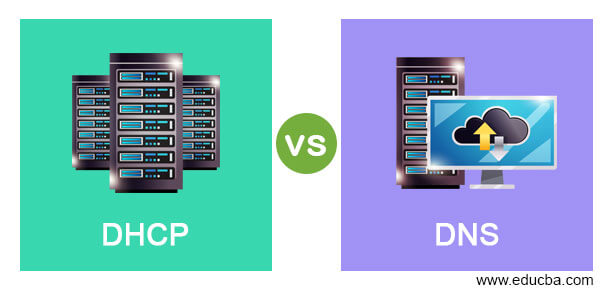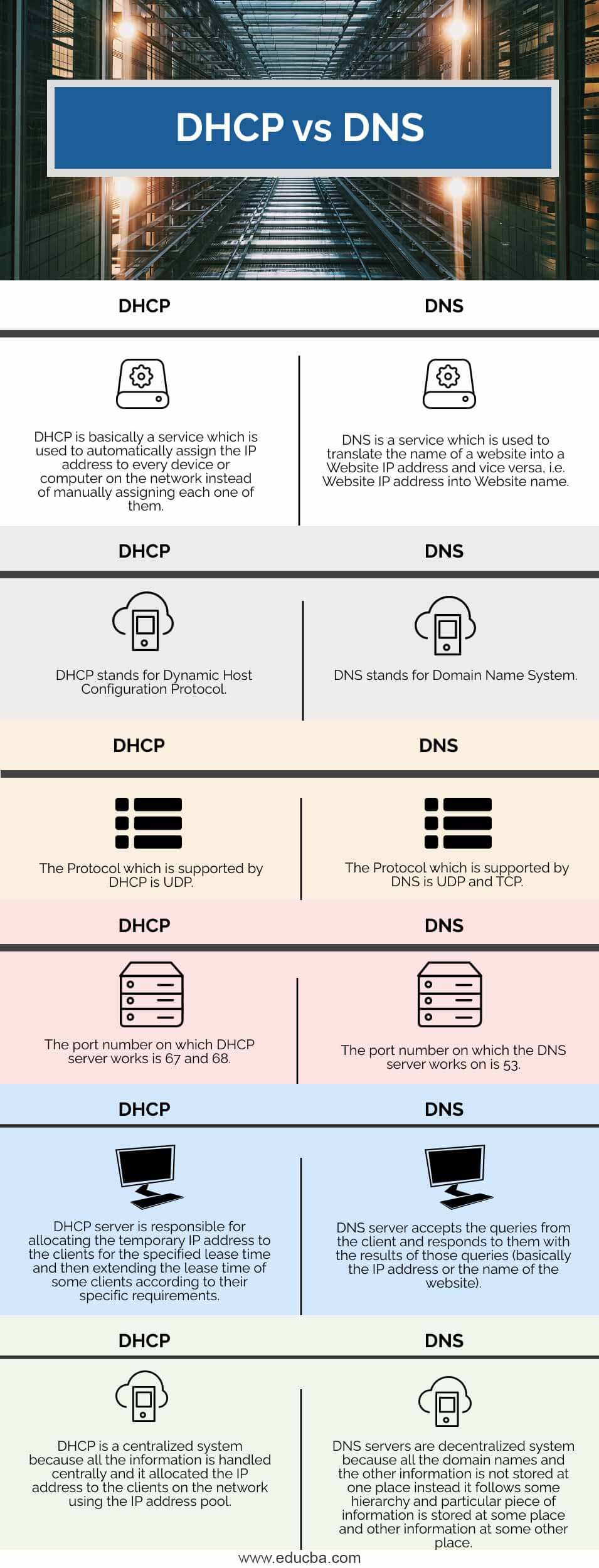Updated April 10, 2023
Difference Between DHCP vs DNS
DHCP which stands for Dynamic Host Configuration Protocol which is used to assign the IP addresses to the computers and other devices on the Internet. It makes it easier to connect the old devices easily with the network without the overhead of manually assigning the IP addresses for the constantly changing clients like schools, offices, etc. It allocates the temporary IP address for a particular lease time and changes the lease time of the clients according to the specific requirements.
DNS which stands for Domain Name System is a decentralized naming system for the computers and other devices on the internet to translate the domain name of the devices connected on the internet or any other private network to the numerical IP addresses and vice versa. It eliminates the need for the user to remember the IP address of each domain. It works somewhat like the telephone book with the provision of IP address of each domain name.
Head to Head Comparison between DHCP vs DNS (Infographics)
Below are the top 6 differences between DHCP vs DNS:
Key Differences between DHCP vs DNS
Some of the Key Differences between the DHCP and DNS technologies are given below in detail:
- Both the DHCP and DNS resolve the different purposes. DHCP is used to allocate the IP addresses to the clients or the computers automatically on the network for a specific lease time and extend that lease time for the particular client when required whereas DNS service is an address resolving mechanism which is used to translate the domain name into the IP address and vice versa.
- Along with allocating the IP address to the computer or other devices on the internet, DHCP provides additional information to clients like the subnet mask of the computer and IP address of the host whereas DNS is used to locate the active directory domain servers to the clients along with a translation of IP address to the domain name and vice versa.
- The main advantage that the DHCP service provides is the reduction of the overhead of network administrator to manually assign the temporary IP address to each client and provides a reliable medium of allocating the IP addresses whereas the advantage with the DNS service is that it eliminates the need of remembering the long IP address as the domain names are translated into IP addresses using it.
- It is very important to remember the port on which both the DHCP and DNS service works. DHCP works on port numbers 67 and 68 whereas DNS works on port numbers 53.
- DHCP (Dynamic Host Configuration Protocol) supports the UDP protocol whereas DNS (Domain Name System) supports both the UDP and TCP protocol.
- DNS is a centralized system that works in a hierarchical manner to translate the domain name of a website like xyz.com into a numerical IP address like 87.77.199.132 and vice versa. It consists of thousands of servers working together with some information stored at one server and the other information on the other servers. If one server cannot resolve the query, it can contact the other servers for the same whereas DHCP is a centralized system as all the information related to the IP addresses are stored in the central IP address pool from which the IP addresses are distributed to the clients (may be the computers, tablets, smartphones, etc.) by the server on the internet.
- DHCP is helpful especially when there is a large network of devices on the internet and most of them change frequently like employees of the company are working on the same network in some project, IP address of the changes frequently whereas DNS is helpful in the scenarios when there the domain name is used for web addresses and the casual user does not need to remember the IP address of each device connected on the internet.
DHCP vs DNS Comparison Table
Both the DHCP and DNS serve different purposes for the clients connected to the network. Below given is the comparison table showing the head to head comparison between the DHCP and DNS to help you understand it better:
| S.No. | DHCP | DNS |
|
|
DHCP is basically a service that is used to automatically assign the IP address to every device or computer on the network instead of manually assigning each one of them. | DNS is a service that is used to translate the name of a website into a Website IP address and vice versa, i.e. Website IP address into Website name. |
|
|
DHCP stands for Dynamic Host Configuration Protocol. | DNS stands for Domain Name System. |
|
|
The Protocol which is supported by DHCP is UDP. | The Protocol which is supported by DNS is UDP and TCP. |
|
|
The port number on which DHCP server works is 67 and 68. | The port number on which the DNS server works is 53. |
|
|
DHCP server is responsible for allocating the temporary IP address to the clients for the specified lease time and then extending the lease time of some clients according to their specific requirements. | DNS server accepts the queries from the client and responds to them with the results of those queries (basically the IP address or the name of the website). |
|
|
DHCP is a centralized system because all the information is handled centrally and is allocated the IP address to the clients on the network using the IP address pool. | DNS servers are decentralized systems because all the domain names and the other information is not stored at one place instead it follows some hierarchy and the particular piece of information is stored at someplace and other information at some other place. |
| DHCP | DNS |
| DHCP is basically a service that is used to automatically assign the IP address to every device or computer on the network instead of manually assigning each one of them. | DNS is a service that is used to translate the name of a website into a Website IP address and vice versa, i.e. Website IP address into Website name. |
| DHCP stands for Dynamic Host Configuration Protocol. | DNS stands for Domain Name System. |
| The Protocol which is supported by DHCP is UDP. | The Protocol which is supported by DNS is UDP and TCP. |
| The port number on which DHCP server works is 67 and 68. | The port number on which the DNS server works is 53. |
| DHCP server is responsible for allocating the temporary IP address to the clients for the specified lease time and then extending the lease time of some clients according to their specific requirements. | DNS server accepts the queries from the client and responds to them with the results of those queries (basically the IP address or the name of the website). |
| DHCP is a centralized system because all the information is handled centrally and is allocated the IP address to the clients on the network using the IP address pool. | DNS servers are decentralized systems because all the domain names and the other information is not stored at one place instead it follows some hierarchy and the particular piece of information is stored at someplace and other information at some other place. |
Conclusion
The above description clearly explains what DHCP and DNS are and the major differences between them. Both the DHCP and DNS services perform the separate role for the clients on the network. DHCP is the time-saving and the fast process of configuring the IP address to the clients connected on the internet automatically instead of manually assigning them to each client whereas DNS facilitates the user to translate the domain name into an IP address without the headache of remembering the complex IP addresses.
Recommended Articles
This is a guide to DHCP vs DNS. Here we discuss the definition, the key differences, comparison and the different purposes of DHCP and DNS. You may also look at the following articles.




